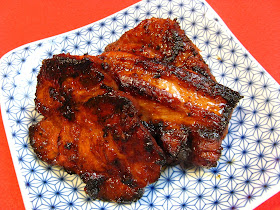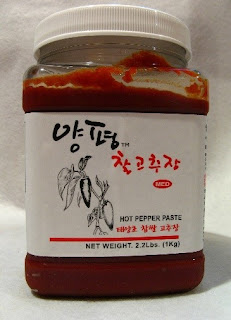This is definitely not an original Korean dish, but the Korean
hot pepper paste (고추장, Gochujang)
and hot pepper powder (고추가루, Gochugaru)
are used to marinade the pork shoulder steaks as in the traditional recipe. The
traditional recipe uses pork belly and is cooked on an indoor grill, with the cooked
pork being wrapped in lettuce leaves (and other added ingredients) before being
consumed whole. This recipe is an Americanized outdoor barbeque version of this
dish using pork shoulder steaks. The amount of hot pepper powder can be varied
depending upon your tolerance for spiciness. The hot pepper paste actually
provides more sweetness to the dish than spice, so there’s no need to use
hoisin sauce (my usual sauce used in marinades). This is a really easy and
tasty way to grill pork (or any other meat) and is very similar to a previously
published recipe: Grilled
Gochujang (Hot Pepper Paste) Pork Ribeye Steaks.
Enjoy!
Ingredients
|
2-4
|
2-4
|
Pork shoulder steaks, thinly sliced to ½-inch (15 mm.)
thickness
|
|
½ in.
|
15 mm.
|
Knob of ginger
(薑, goeng1), crushed in a garlic
press
|
|
4 cloves
|
4 cloves
|
Garlic (蒜, syun3), crushed in a garlic press
|
|
1 Tbs.
|
15 ml.
|
Korean Hot Pepper Powder (고추가루, Gochugaru)
|
|
2 Tbs.
|
30 ml.
|
Korean Hot Pepper Paste (고추장, Gochujang)
|
|
½ cup
|
125 ml.
|
Soy sauce (豉油, si6
jau4)
|
|
½ cup
|
125 ml.
|
Shaoxing rice wine (紹興酒,
siu6 hing1 zau2) or dry sherry
|
|
½ tsp.
|
2.5 ml.
|
Ground white pepper (白胡椒,
baak6 wu4 ziu1)
|
|
1 Tbs.
|
15 ml.
|
Sesame oil (麻油, maa4
jau4)
|
Equipment
|
|
|
Garlic press
|
|
|
|
Tongs and an oil coated paper towel
|
|
22.5 in.
|
57 cm.
|
Covered charcoal or gas grill (or larger)
|
Instructions
- Use thinly sliced pork shoulder steaks at least ½-inch (15 mm.) thick. Marinate the pork in a covered container for at least one hour or overnight in the refrigerator with the ginger and garlic crushed in a garlic press, Korean Hot Pepper Powder, Korean Hot Pepper Paste, soy sauce, Shaoxing rice wine or dry sherry, ground white pepper, and sesame oil. If marinating the pork overnight, take it out of the refrigerator at least one hour before cooking.
- Prepare the charcoal or gas grill for indirect cooking following the manufacturer’s instructions. Light the charcoal or preheat the gas grill accordingly. Soak the mesquite smoking wood (pecan, oak, or any other wood can be used) for one hour if desired. I use dry and not soaked wood.
- If using a charcoal grill, arrange the lighted coals on one half of the grill. The side of the grill with the coals (the “hot” side) will be used to grill the pork and the side without the coals (the “cool” side) will be used for smoking the pork. For a gas grill, follow the manufacturer’s instructions as to which burners to leave on for indirect cooking. Clean the grill grate and then, using tongs and a paper towel coated with oil, lubricate the grate to prevent the pork from sticking. Put the smoking wood onto the coals or as per the instructions for the gas grill.
- Place the pork chops on the hot side of the grill for 1½-2 minutes uncovered. Rotate the pork chops 90⁰ and cook for another 1½-2 minutes uncovered to produce the grill marks. Turn the pork chops over and repeat the procedure to produce the grill marks on the other side.
- Move the pork chops to the cold side of the grill, cover the grill, and indirect heat will be used to roast the pork chops for 5-7 minutes. For thicker pork chops, the amount of time cooking needs to be increased. The temperature of your fire and previous experience with your grill will determine the total cooking time for the pork chops. Remove the pork chops from the grill and allow to rest for 5 minutes before serving.
 |
| Korean Hot Pepper Powder (고추가루, Gochugaru) |


No comments:
Post a Comment